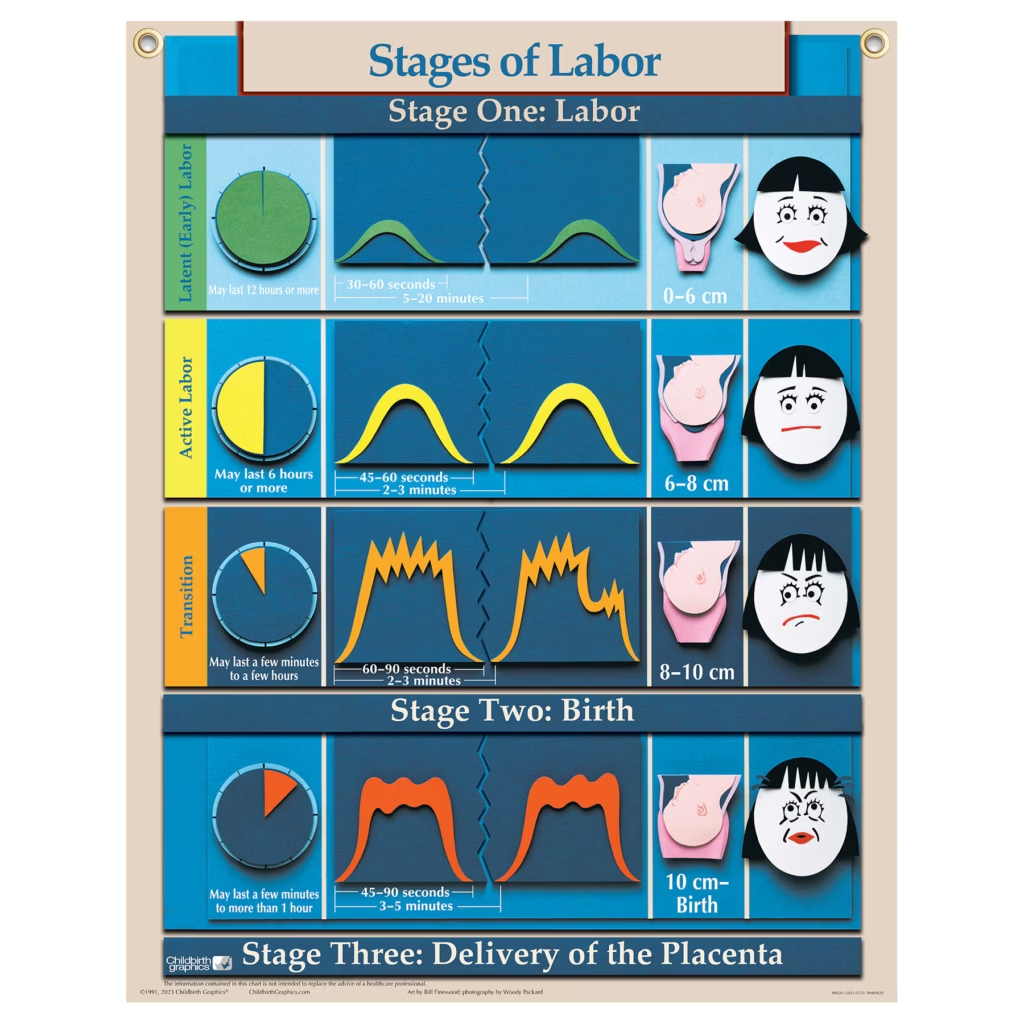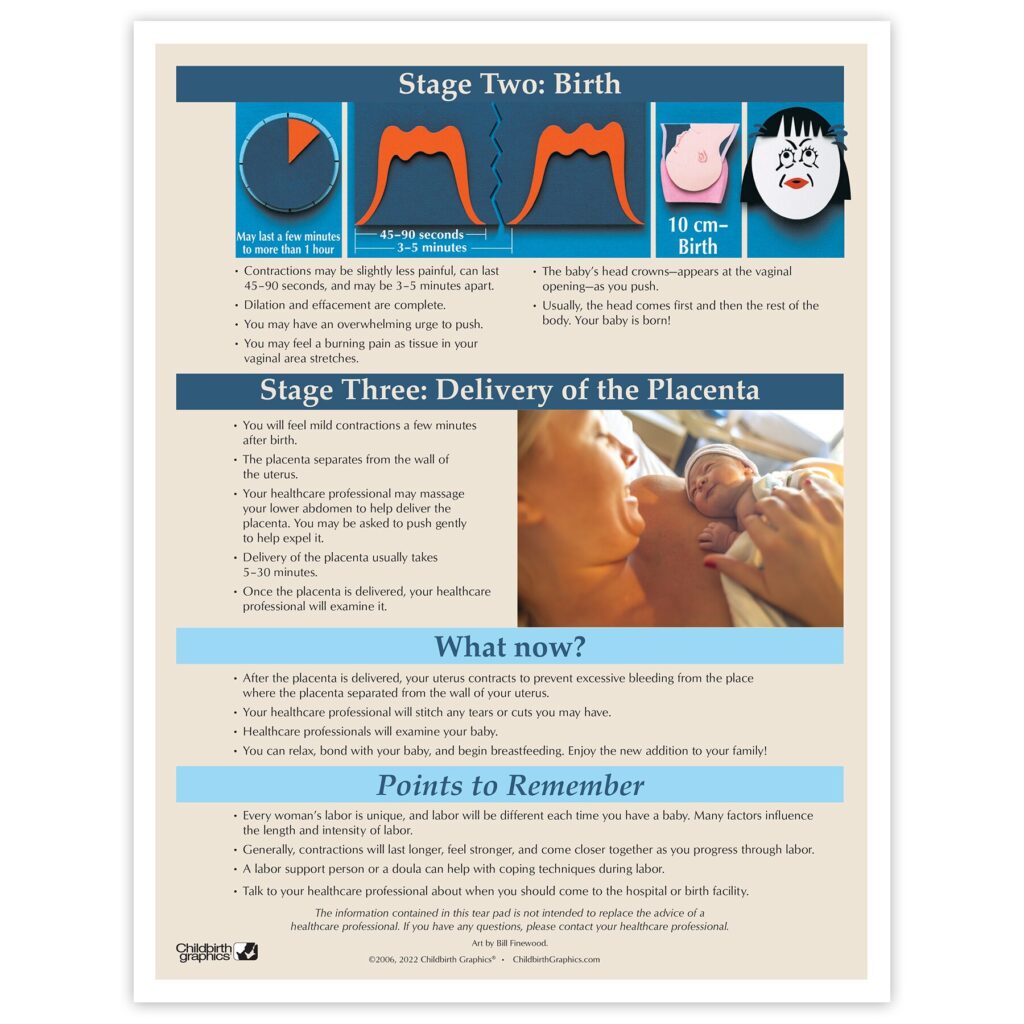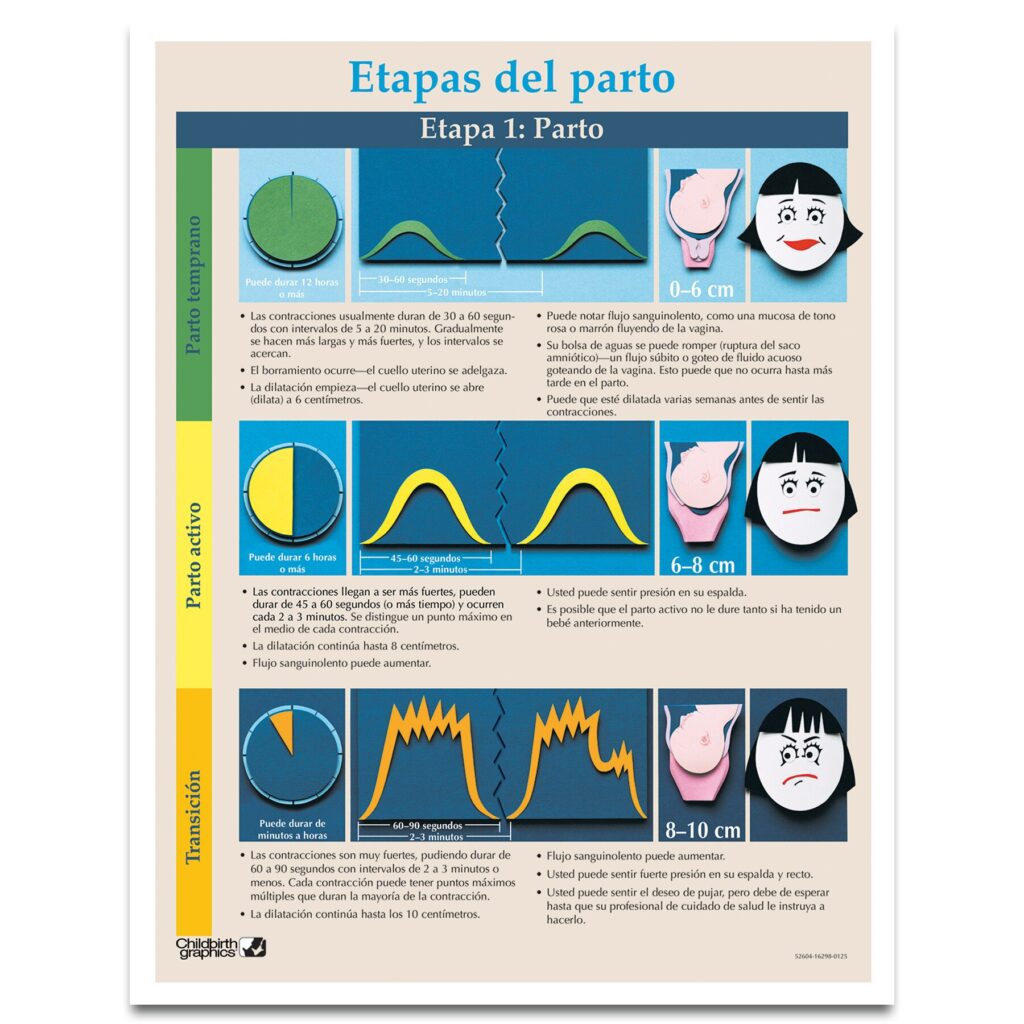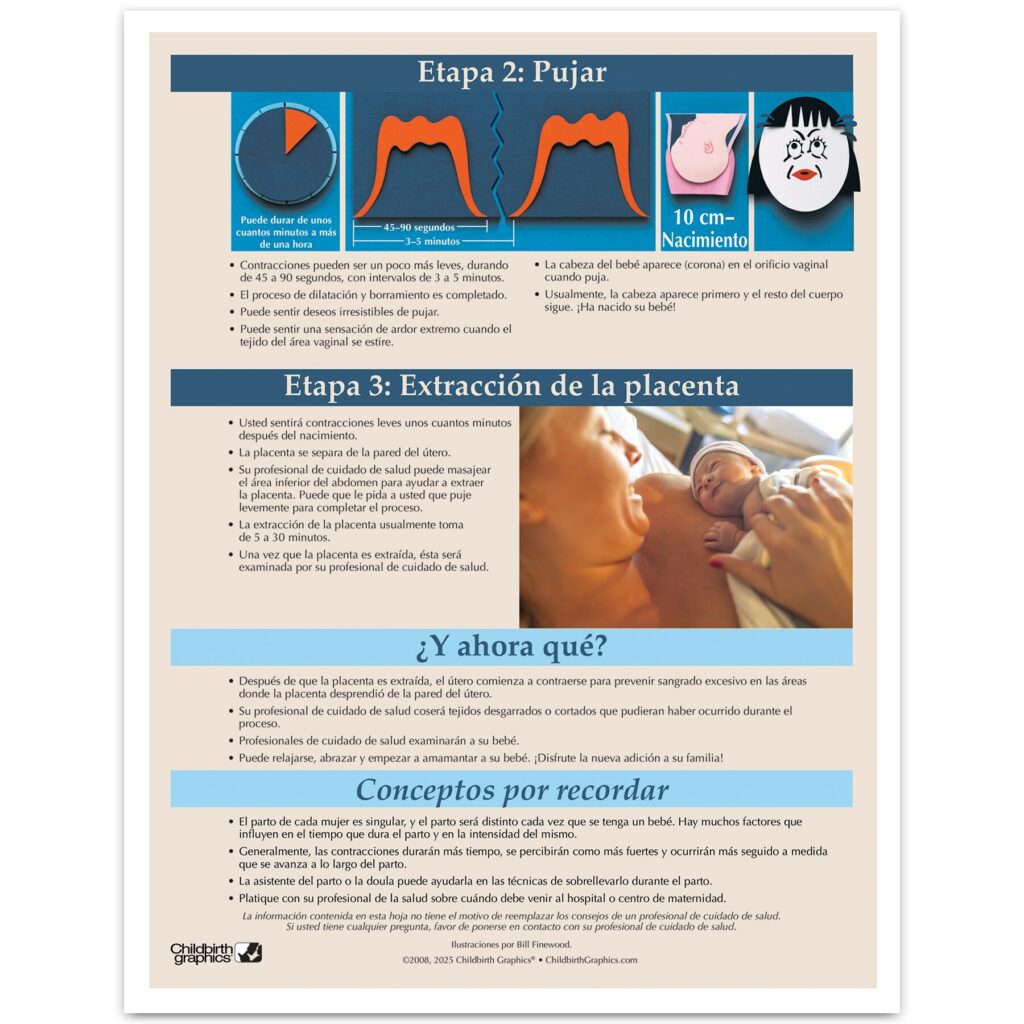
Bringing a baby into the world is a life-changing experience. Understanding the stages of labor helps birthing people feel more prepared and supported, while giving birth partners the tools they need to offer effective care and calm reassurance. Whether you’re giving birth or standing beside someone who is, this guide breaks it all down with real talk, clear advice, and actionable tips for each stage of labor.
Stage 1: Early Labor, Active Labor, & Transition
Phase 1: Early Labor (6–12+ hours)
What’s Happening:
- Cervix dilates 0–4 cm
- Contractions begin, irregular and mild
- Some cramping, back pain, and light bleeding possible
Birthing Partner Support:
Help time contractions using an app or timer
Create a calm space—dim lights, play soft music, reduce stress
Offer light snacks, hydration, and encourage rest
Validate emotions and ease anxiety with reassurance
Dos:
- Encourage light movement, breathing, or a warm bath
- Stay present and calm—your energy sets the tone
Don’ts:
- Don’t tell your partner “It’s not that bad”
- Don’t pressure them to go to the hospital too early unless advised
Phase 2: Active Labor (4–7 cm, 4–8 hours)
What’s Happening:
- Contractions become stronger and closer together
- More discomfort and increased focus inward
- This is typically when most people go to the hospital or birthing center
Birthing Partner Support:
Offer counter-pressure on lower back or hips
Remind your partner to breathe through each contraction
Act as their voice with staff if needed (especially during contractions)
Offer words of encouragement: “You’re doing amazing,” “One step closer,” “I’m right here”
Dos:
- Be an advocate—ask questions, clarify options
- Suggest changing positions for comfort
- Offer sips of water or lip balm
Don’ts:
- Don’t scroll your phone or seem distracted
- Don’t take irritability personally—it’s part of labor intensity
Phase 3: Transition (7–10 cm, 30 minutes to 2 hours)
What’s Happening:
- Intense, back-to-back contractions
- Shaking, nausea, or self-doubt may occur
- Strong urge to push may begin
Birthing Partner Support:
Keep calm and focused even if your partner seems overwhelmed
Offer a cool cloth, massage, or words of affirmation
Help them find a comfortable position or request a break if needed
Remind them they are so close to meeting their baby
Dos:
- Reassure and coach calmly
- Be hands-on—offer physical comfort if welcome
Don’ts:
- Don’t panic or mirror their anxiety
- Don’t ask lots of questions—follow their lead or ask providers quietly
Stage 2: Pushing and Birth (20 minutes – 2+ hours)
What’s Happening:
- Full dilation, time to push
- Intense effort and pressure
- Baby is born!
Birthing Partner Support:
Hold their hand or leg (if allowed)
Be their biggest cheerleader—praise each push
Help count if guided by staff (some like rhythmic cues)
Capture the moment if asked—photos, cut the cord, or simply witness
Dos:
- Stay at their level—eye contact and presence mean everything
- Be proud and loving—it’s a beautiful moment
Don’ts:
- Don’t over-talk or coach aggressively unless asked
- Don’t express worry—stay confident and grounded
Stage 3: Delivering the Placenta (5–30 minutes)
What’s Happening:
- Mild contractions resume to expel placenta
- Medical team checks for bleeding and stitching if needed
- Emotional release and bonding begin
Birthing Partner Support:
Stay by their side and offer water, snacks, or a blanket
Help facilitate skin-to-skin or breastfeeding
Be present and emotionally available
Dos:
- Offer gentle reassurance—“You did it,” “I’m so proud of you”
- Take photos (if welcome) and soak in the moment
Don’ts:
- Don’t rush or ask for attention
- Don’t downplay what just happened—it was monumental
Pain Relief Recap: What You Both Should KnowNatural Options:
- Breathing, position changes, massage, water immersion, acupressure
Medical Options:
- Epidural (most common)
- IV medications (short-term relief)
- Nitrous oxide (“laughing gas”)
Partners can support by reminding of choices, advocating if needed, and staying informed.
Final Thoughts for Partners:
The birthing partner’s role isn’t just helpful—it’s powerful. Your calm, supportive presence can shape the entire experience, making your partner feel seen, safe, and strong. The key is to be present, loving, informed, and flexible.
You’re not just a spectator—you’re part of the team.
Additional Resoruces:




Video Resources:
English:
Spanish:
Westchester County Resources
1. Westchester County Department of Health – Maternal Child Services
Offers prenatal education, referrals for labor and delivery preparation, and connections to childbirth classes.
Phone: (914) 813-5000
Email: [email protected]
Website: https://health.westchestergov.com
2. Westchester Medical Center – Labor & Delivery Education (Valhalla Campus)
Provides childbirth education classes covering all stages of labor, pain management techniques, and hospital tour options.
Phone: (914) 493-2250
Email: [email protected]
Website: https://www.westchestermedicalcenter.org
3. Open Door Family Medical Centers – Ossining, Mount Kisco, Port Chester, Sleepy Hollow
Offers prenatal classes and support groups that cover the labor process and coping techniques for birthing individuals.
Phone: (914) 941-1263
Email: [email protected]
Website: https://www.opendoormedical.org
4. Planned Parenthood Hudson Peconic – White Plains & Yonkers Locations
Provides reproductive health counseling and prenatal support, including referrals for childbirth education and mental health services.
Phone: (800) 230-7526
Email: [email protected]
Website: https://www.plannedparenthood.org/planned-parenthood-hudson-peconic
5. Yonkers Riverfront Library – Parenting & Birth Workshops
Offers free community programs and educational classes on labor, birth, and parenting for expecting families.
Phone: (914) 337-1500
Email: [email protected]
Website: https://www.ypl.org
6. 211 of the Hudson Valley (United Way of Westchester and Putnam)
Provides referrals to childbirth education classes, prenatal coaches, and support services throughout the region.
Phone: 2-1-1 or (800) 899-1479
Email: [email protected]
Website: https://www.hudson211.org
Putnam County Resources
1. Putnam County Department of Health – Maternal Health & Education
Provides prenatal information, childbirth education referrals, and public health nurse support.
Phone: (845) 808-1390
Email: [email protected]
Website: https://www.putnamcountyny.com/health
2. Open Door Family Medical Center – Brewster Location
Offers bilingual prenatal education and referrals for childbirth classes that build confidence in labor preparation.
Phone: (845) 279-6999
Email: [email protected]
Website: https://www.opendoormedical.org
3. Putnam Hospital Center (Nuvance Health – Carmel)
Offers childbirth preparation classes, hospital tours, and support for labor coping methods.
Phone: (845) 279-5711
Email: [email protected]
Website: https://www.nuvancehealth.org
4. Cornell Cooperative Extension of Putnam County – Family & Health Program
Provides parenting classes and occasional childbirth education events in partnership with local health providers.
Phone: (845) 278-6738
Email: [email protected]
Website: https://cceputnamcounty.org
5. Putnam Community Action Partnership (CAP)
Supports expecting families with referrals for childbirth classes, maternal health workshops, and emotional readiness.
Phone: (845) 278-8021
Email: [email protected]
Website: https://www.putnamcap.org
Westchester County Resources
1. Westchester County Department of Health – Fatherhood & Family Engagement Support
Connects expectant fathers and partners to parenting support, prenatal classes, and programs that encourage partner involvement.
Phone: (914) 813-5000
Email: [email protected]
Website: https://health.westchestergov.com
2. Open Door Family Medical Centers – Prenatal & Family Support Programs
Offers inclusive prenatal education and support groups for both birthing and non-birthing parents, including communication, emotional support, and co-parenting skills.
Phone: (914) 941-1263
Email: [email protected]
Website: https://www.opendoormedical.org
3. Planned Parenthood Hudson Peconic – White Plains & Yonkers Locations
Provides counseling and information for partners on their role in pregnancy and parenthood, with inclusive, supportive environments for all identities.
Phone: (800) 230-7526
Email: [email protected]
Website: https://www.plannedparenthood.org/planned-parenthood-hudson-peconic
4. Westchester Medical Center – Family-Centered Maternity Care
Encourages partner participation in childbirth education classes, labor and delivery, and postpartum care planning.
Phone: (914) 493-2250
Email: [email protected]
Website: https://www.westchestermedicalcenter.org
5. Family Services of Westchester – Parent Coaching & Counseling
Offers family therapy, parenting classes, and support groups for non-birthing parents to build confidence in bonding, caregiving, and emotional support.
Phone: (914) 937-2320
Email: [email protected]
Website: https://www.fsw.org
6. 211 of the Hudson Valley (United Way of Westchester and Putnam)
Free referrals for co-parenting classes, emotional support, fatherhood programs, and local workshops supporting involved non-birthing parents.
Phone: 2-1-1 or (800) 899-1479
Email: [email protected]
Website: https://www.hudson211.org
Putnam County Resources
1. Putnam County Department of Health – Family Health Services
Supports all parents with prenatal education, referrals for family-based classes, and public health nurse visits that encourage partner involvement.
Phone: (845) 808-1390
Email: [email protected]
Website: https://www.putnamcountyny.com/health
2. Open Door Family Medical Center – Brewster Location
Provides prenatal classes for both parents, peer groups, and individualized coaching for non-birthing partners.
Phone: (845) 279-6999
Email: [email protected]
Website: https://www.opendoormedical.org
3. Putnam Community Action Partnership (CAP)
Offers parenting resources and connections to workshops that focus on shared responsibilities, emotional bonding, and caregiving confidence for partners.
Phone: (845) 278-8021
Email: [email protected]
Website: https://www.putnamcap.org
4. Cornell Cooperative Extension of Putnam County – Family & Health Program
Provides parenting classes and educational programs for all caregivers, including sessions focused on father involvement and early childhood connection.
Phone: (845) 278-6738
Email: [email protected]
Website: https://cceputnamcounty.org
5. Nuvance Health – Putnam Hospital Center (Carmel)
Encourages non-birthing parent participation in prenatal visits, childbirth classes, and newborn care orientation sessions.
Phone: (845) 279-5711
Email: [email protected]
Website: https://www.nuvancehealth.org
Bibliography
American College of Obstetricians and Gynecologists. (n.d.). Labor and delivery. https://www.acog.org/womens-health/faqs/labor-and-delivery
Bohren, M. A., Hofmeyr, G. J., Sakala, C., Fukuzawa, R. K., & Cuthbert, A. (2017). Continuous support for women during childbirth. Cochrane Database of Systematic Reviews, 7, CD003766. https://doi.org/10.1002/14651858.CD003766.pub6
Lamaze International. (n.d.). Labor positions and comfort techniques. https://www.lamaze.org
Mayo Clinic. (n.d.). What you can expect during labor and delivery. https://www.mayoclinic.org/tests-procedures/labor-and-delivery/about/pac-20393568
Simkin, P., & Bolding, A. (2004). Update on nonpharmacologic approaches to relieve labor pain and prevent suffering. Journal of Midwifery & Women’s Health, 49(6), 489–504. https://doi.org/10.1016/j.jmwh.2004.07.007
World Health Organization. (2018). WHO recommendations: Intrapartum care for a positive childbirth experience. https://www.who.int/publications/i/item/9789241550215
Legal Disclaimer: The information provided by our nonprofit is for informational purposes only and not a substitute for professional medical advice, diagnosis, or treatment. Always consult a qualified healthcare provider for medical concerns. We make no guarantees about the accuracy or completeness of the information and are not liable for any decisions made based on it. If you have a medical emergency, call 911 or seek immediate medical care.


